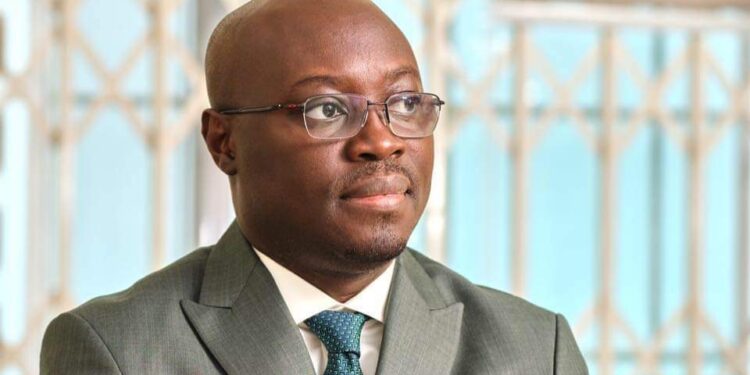Ghana’s Finance Minister Ato Forson Outlines Bold Fiscal Reforms at IMF-World Bank Spring Meetings
- Promises to Clean Up Public Finances and Win Back Investor Trust
Ghana’s Finance Minister, Dr. Cassiel Ato Forson, has pledged a sweeping overhaul of the country’s fiscal management systems as he leads Ghana’s first delegation to the IMF and World Bank Spring Meetings under President John Dramani Mahama’s newly inaugurated administration.
In a statement posted on his X account in Washington, D.C., Dr. Forson framed the visit as a turning point in Ghana’s economic recovery efforts. He stated that the country is “resetting” after years of fiscal mismanagement, rising debt, and missed structural reform targets. His remarks come just days after Ghana reached a Staff-Level Agreement (SLA) with the International Monetary Fund (IMF) on the fourth review of its three-year Extended Credit Facility programme.
The SLA, once ratified by the Fund’s Executive Board, is expected to unlock a disbursement of US$370 million, providing much-needed balance of payments support. However, beyond the expected inflow, Forson stressed that the agreement signals renewed credibility.
“This progress was achieved despite several structural benchmarks and quantitative targets being missed before we assumed office. It is a testament to the tireless work that this new administration has put in over the last few months to reverse the fiscal slippages we inherited,” he said.
A New Fiscal Regime Underway
Dr. Forson announced a raft of legislative and administrative reforms aimed at tightening public financial management, controlling expenditure, and introducing hard budget constraints across government ministries.
Among the key measures:
- Audit of Outstanding Payables: The Auditor-General has been tasked to conduct a full audit of all 2024 payables and financial commitments to establish their legitimacy. The audit is to be completed within eight weeks.
- Amendments to the Procurement Act: All central government procurement will now require prior written approval from the Minister of Finance to proceed, a move Forson says will “inject discipline and transparency” into public expenditure.
- Strengthened Public Financial Management Act: New rules to be legislated include a debt rule targeting a reduction in Ghana’s debt-to-GDP ratio to 45% by 2035, and a mandatory primary surplus of at least 1.5% of GDP annually. Additionally, the government plans to establish an Independent Fiscal Council to monitor adherence to these fiscal anchors.
- Compliance Enforcement: A Compliance Desk has been established within the Ministry of Finance to monitor adherence to the PFM Act. A forthcoming Commitment Control Compliance League Table will publicly rank Ministries, Departments, and Agencies (MDAs) based on fiscal discipline.
“These reforms are not merely about satisfying IMF conditionalities,” Forson said. “They are about restoring trust in public finances and ensuring the credibility of our budgeting process.”
Observers say the measures reflect an effort by the Mahama-led government to assert domestic ownership of the IMF programme, in contrast to previous technocratic approaches. The tone is more assertive, the targets more ambitious, and the delivery timelines noticeably compressed.
Investor Relations and Geopolitical Signaling
During his time in Washington, the Finance Minister will meet with IMF Managing Director Kristalina Georgieva, the U.S. Treasury, credit rating agencies, members of the Paris Club, and representatives of key development institutions.
The central message, Forson says, is that Ghana is acting decisively to stabilise its economy and is ready to re-engage credibly with development partners and capital markets alike.
“This is the urgency with which we are working to reset this economy,” he said, referring to the fast-tracked implementation of structural benchmarks previously scheduled for late 2024 and early 2025.
Economists following Ghana’s programme say the country’s ability to sustain these reforms, especially in the face of political pressure and public spending demands, will be the true test of the new fiscal architecture.
“Setting up the rules is one thing. Enforcing them when the political cost is high is another,” said a West Africa-based IMF observer, speaking on condition of anonymity.
Looking Ahead
Ghana remains in debt restructuring negotiations with external creditors, including China and the Paris Club, following a domestic restructuring in 2023. While the SLA does not imply immediate debt service relief, it signals confidence from the IMF in the government’s economic policy trajectory.
If sustained, the reforms could pave the way for Ghana’s eventual return to international capital markets, potentially by 2026, analysts say.
As Dr. Forson rounds off his week in Washington, the message is clear: Ghana is not merely complying—it is resetting. Whether the momentum endures will depend on how well these policies translate into sustained macroeconomic stability and inclusive growth back home.







